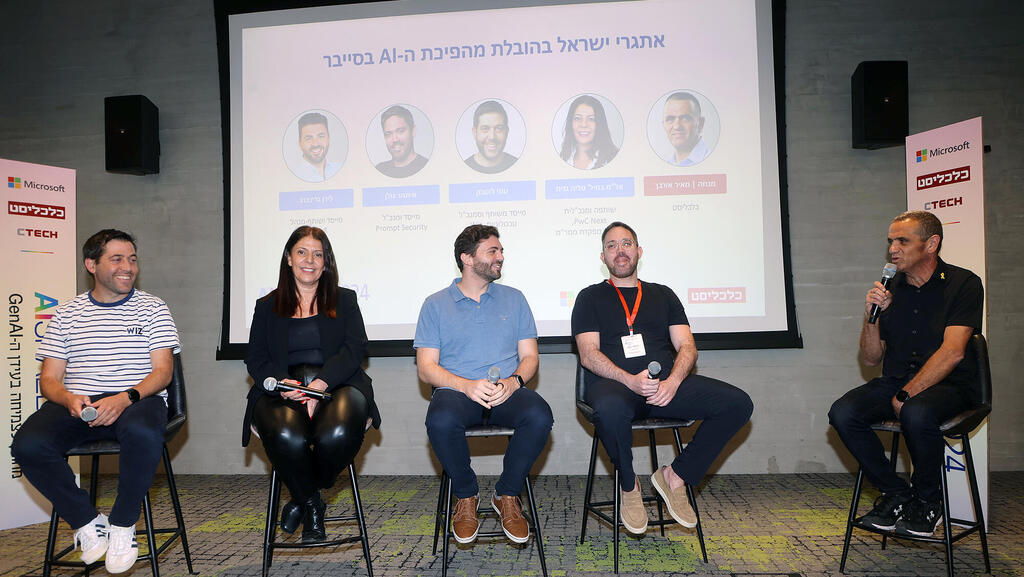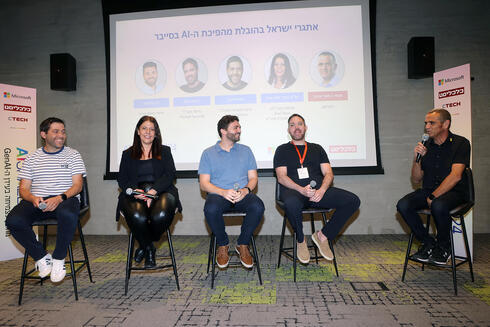
"The IDF needs to change its defense concepts and incorporate more AI tools"
Talya Gazit, partner and CEO of PwC Next and former head of “Mamram”, the IDF technology and cyber defense unit, was speaking on a panel on cyber at the AIsrael conference. Also participating were Liran Grinberg, founder and managing partner of Team8, Ami Luttwak, co-founder and VP of Technologies at Wiz, and Itamar Golan, founder and CEO, Prompt Security
"Israel may not be in first place when it comes to the basic models of AI, but when it comes to hardware, and certainly in the use of organizations and applications, we have amazing talent and we are at the cutting edge. I think that because of the breakthroughs in AI, and the motivation to produce innovation, the investment in this field will be tremendous and fantastic companies will be created so that Israel will continue to be at the forefront of AI," said Liran Grinberg, founder and managing partner of Team8, speaking on a panel on cyber at Microsoft and Calcalist's AIsrael conference.
To the question of how AI is going to affect the IDF and how he sees the effect on the cyber world, Col. (res.) Talya Gazit, partner and CEO of PwC Next; former commander of Mamram, the IDF technology and cyber defense unit, replied that "When looking at cyber, it is correct to look at the development that is taking place at very fast rates. Military entities, and also organizations with strategic assets, if they remain in the conventional defense concepts, their chances of protecting their assets are very small. Military bodies are required to change their defense concepts and also integrate more generative AI tools.”
To the question of whether AI can change Wiz's position as a leader in the cloud field, Ami Luttwak, co-founder and VP of technologies at Wiz, replied, "What we see is that there are more than 70% of cloud environments that already use AI systems. This is probably the fastest technology to be adopted. Our goal is to help security teams and every such team in the world wants to use AI tools and will have to find a way to help them do it safely. The use of AI can make defenders 10 times more effective and on the other hand new technology introduces new risks. The challenge for us at Wiz is how to help security teams speak the language of AI," he said.
Related articles:
Itamar Golan, founder and CEO at Prompt Security, said that "The hype around AI is huge, but in the long term it is insufficient. The impact is unimaginable if we deal with it everyday but if we look 10 years ahead, everything is going to look completely different. The barrier to entry is much lower today. Any developer can build an amazing app with AI. The pace is crazy. There are lots of new dangers that the current solutions just don't deal with. The whole paradigm is changing and it is connected from the level of governments to the small company. It is going to cause a lot of pain even for companies that have adopted AI in a frenzy and are suddenly open to risks that their current solutions do not know how to address."
According to Gazit, "There is a window of time in which we do not yet know how to identify content created using AI and the attackers take advantage of this. Paradoxically, despite the speed in adopting AI capabilities, in terms of protection, the process is much slower. When you integrate and adopt AI technologies, they themselves become vulnerable. For example, if the data on which the AI is trained is disrupted. Paradoxically, organizations have not yet understood that they are required to invest precisely in the aspects of defense in this world."
